This site uses cookies as defined in our Cookie Policy, by continuing to use this site you agree to their use.
Continue
| Arrive | Depart | ||||||
| 28th28 | DecDec | 202424 | Buenos Aires, Argentina, embark on the MS Roald Amundsen | ||||
Glamorous and gritty, Buenos Aires is two cities in one. What makes Argentina's capital so fascinating is its dual heritage—part European, part Latin American. Plaza de Mayo resembles a grand square in Madrid, and the ornate Teatro Colón would not be out of place in Vienna. But you’ll know you’re in South America by the leather shoes for sale on cobbled streets and impromptu parades of triumphant soccer fans. Limited-production wines, juicy steaks, and ice cream in countless flavors are among the old-world imports the city has perfected. | |||||||
| 29th29 | DecDec | 202424 | Ushuaia, Argentina | 19:00 | |||
At 55 degrees latitude south, Ushuaia (pronounced oo-swy-ah) is closer to the South Pole than to Argentina's northern border with Bolivia. It is the capital and tourism base for Tierra del Fuego, the island at the southernmost tip of Argentina.Although its stark physical beauty is striking, Tierra del Fuego's historical allure is based more on its mythical past than on rugged reality. The island was inhabited for 6,000 years by Yámana, Haush, Selk'nam, and Alakaluf Indians. But in 1902 Argentina, eager to populate Patagonia to bolster its territorial claims, moved to initiate an Ushuaian penal colony, establishing the permanent settlement of its most southern territories and, by implication, everything in between.When the prison closed in 1947, Ushuaia had a population of about 3,000, made up mainly of former inmates and prison staff. Today the Indians of Darwin's "missing link" theory are long gone—wiped out by diseases brought by settlers and by indifference to their plight—and the 60,000 residents of Ushuaia are hitching their star to tourism.The city rightly (if perhaps too loudly) promotes itself as the southernmost city in the world (Puerto Williams, a few miles south on the Chilean side of the Beagle Channel, is a small town). You can make your way to the tourism office to get your clichéd, but oh-so-necessary, "Southernmost City in the World" passport stamp. Ushuaia feels like a frontier boomtown, at heart still a rugged, weather-beaten fishing village, but exhibiting the frayed edges of a city that quadrupled in size in the '70s and '80s and just keeps growing. Unpaved portions of Ruta 3, the last stretch of the Pan-American Highway, which connects Alaska to Tierra del Fuego, are finally being paved. The summer months (December through March) draw more than 120,000 visitors, and dozens of cruise ships. The city is trying to extend those visits with events like March's Marathon at the End of the World and by increasing the gamut of winter activities buoyed by the excellent snow conditions.A terrific trail winds through the town up to the Martial Glacier, where a ski lift can help cut down a steep kilometer of your journey. The chaotic and contradictory urban landscape includes a handful of luxury hotels amid the concrete of public housing projects. Scores of "sled houses" (wooden shacks) sit precariously on upright piers, ready for speedy displacement to a different site. But there are also many small, picturesque homes with tiny, carefully tended gardens. Many of the newer homes are built in a Swiss-chalet style, reinforcing the idea that this is a town into which tourism has breathed new life. At the same time, the weather-worn pastel colors that dominate the town's landscape remind you that Ushuaia was once just a tiny fishing village, snuggled at the end of the Earth.As you stand on the banks of the Canal Beagle (Beagle Channel) near Ushuaia, the spirit of the farthest corner of the world takes hold. What stands out is the light: at sundown the landscape is cast in a subdued, sensual tone; everything feels closer, softer, and more human in dimension despite the vastness of the setting. The snowcapped mountains reflect the setting sun back onto a stream rolling into the channel, as nearby peaks echo their image—on a windless day—in the still waters.Above the city rise the last mountains of the Andean Cordillera, and just south and west of Ushuaia they finally vanish into the often-stormy sea. Snow whitens the peaks well into summer. Nature is the principal attraction here, with trekking, fishing, horseback riding, wildlife spotting, and sailing among the most rewarding activities, especially in the Parque Nacional Tierra del Fuego (Tierra del Fuego National Park). | |||||||
| 30th30 | DecDec | 202424 | At Sea | ||||
| 31st31 | DecDec | 202424 | At Sea | ||||
| 1st01 | JanJan | 202525 | South Shetland Islands, Antarctica | 07:00 | 16:00 | ||
Some 770 kilometers (478 miles) south of Cape Horn, the South Shetland Islands are usually the first land seen in Antarctica. Separated from the Antarctic Peninsula by the Bransfield Strait, nine major islands make up the group. The region was the first to be exploited by sealers in the early 19th century, and because of its proximity to South America, it still is the most visited by scientists and tourists. Chinstrap, Adelie, Gentoo and Macaroni Penguins all breed here. In addition, because it is the warmest part of the continent, large moss beds as well as orange, black, grey and green lichens grow –even hair grass and pearlwort manage to survive. Leopard seals, Weddell seals, crabeater seals, Southern elephant seals and Antarctic fur seals can be seen in the water and on the beaches. | |||||||
| 2nd02 | JanJan | 202525 | Orne Harbour, Antarctica | 08:00 | 16:00 | ||
| 2nd02 | JanJan | 202525 | Gerlache Strait, Antarctica | 20:00 | 23:00 | ||
| 3rd03 | JanJan | 202525 | Gerlache Strait, Antarctica | 16:00 | |||
| 4th04 | JanJan | 202525 | At Sea | ||||
| 5th05 | JanJan | 202525 | South Shetland Islands, Antarctica | 10:00 | 18:00 | ||
Some 770 kilometers (478 miles) south of Cape Horn, the South Shetland Islands are usually the first land seen in Antarctica. Separated from the Antarctic Peninsula by the Bransfield Strait, nine major islands make up the group. The region was the first to be exploited by sealers in the early 19th century, and because of its proximity to South America, it still is the most visited by scientists and tourists. Chinstrap, Adelie, Gentoo and Macaroni Penguins all breed here. In addition, because it is the warmest part of the continent, large moss beds as well as orange, black, grey and green lichens grow –even hair grass and pearlwort manage to survive. Leopard seals, Weddell seals, crabeater seals, Southern elephant seals and Antarctic fur seals can be seen in the water and on the beaches. | |||||||
| 6th06 | JanJan | 202525 | At Sea | ||||
| 7th07 | JanJan | 202525 | At Sea | ||||
| 8th08 | JanJan | 202525 | Port Stanley, Falkland Islands (Malvinas) | 08:00 | 18:00 | ||
Tiny Stanley, capital of the Falklands, seems in many ways like a British village fallen out of the sky. Many homes are painted in bright colours, adding visual appeal to this distant outpost. Not far offshore, the wreck of the Lady Elizabeth, is one of the many vessels remaining as a silent testimonial to the region's frequent harsh weather conditions.The islands, also known by their Spanish name of Islas Malvinas, are home to arguably more tuxedo-clad inhabitants of the penguin variety than human residents. Various species, such as Gentoo, Magellanic and the more elusive King penguins, either live here permanently or use the Falklands as a stopover on their migration route. Darwin found the islands' flora and fauna fascinating - no doubt you will, too. | |||||||
| 9th09 | JanJan | 202525 | Saunders Island, Falkland Islands (Malvinas) | 08:00 | 18:00 | ||
Saunders Island is the fourth-largest of the Falkland Islands in the western portion of the archipelago. The island’s topography is unusual, being made up of three peninsulas linked by narrow necks, and three big upland areas. Today the island is run as a sheep farm, but has historical importance as the location of the first British settlement in the Falklands. Saunders’ wildlife is also impressively varied. It is possible to see Gentoo and King Penguins in the open dune and sand-flat area, while Rockhopper Penguins (with the odd pair of Macaroni Penguins in between them), Imperial Shags and Black-browed Albatrosses frequent Mount Richards, the highest point on the island at 457 m (1500 feet). Other key bird species are the Black–throated Finch, Ruddy-headed Goose and Falkland Steamer Duck. | |||||||
| 10th10 | JanJan | 202525 | West Point Island, Falkland Islands (Malvinas) | 08:00 | 16:00 | ||
Located slightly northwest of West Falkland, West Point Island is used for sheep farming and nature observations. Peale’s dolphins and the distinctive black and white markings of the Commerson’s dolphin can usually be seen in the waters around West Point Island. Rolling moorland and steep cliffs make for great photographic opportunities, but the main attraction is the Devil’s Nose, a cliffside colony of Black-browed Albatrosses nesting side-by-side with feisty Rockhopper Penguins. Magellanic Penguins and Magellanic Cormorants can also be found on the island. | |||||||
| 11th11 | JanJan | 202525 | At Sea | ||||
| 12th12 | JanJan | 202525 | Ushuaia, Argentina, disembark the MS Roald Amundsen | 06:00 | |||
At 55 degrees latitude south, Ushuaia (pronounced oo-swy-ah) is closer to the South Pole than to Argentina's northern border with Bolivia. It is the capital and tourism base for Tierra del Fuego, the island at the southernmost tip of Argentina.Although its stark physical beauty is striking, Tierra del Fuego's historical allure is based more on its mythical past than on rugged reality. The island was inhabited for 6,000 years by Yámana, Haush, Selk'nam, and Alakaluf Indians. But in 1902 Argentina, eager to populate Patagonia to bolster its territorial claims, moved to initiate an Ushuaian penal colony, establishing the permanent settlement of its most southern territories and, by implication, everything in between.When the prison closed in 1947, Ushuaia had a population of about 3,000, made up mainly of former inmates and prison staff. Today the Indians of Darwin's "missing link" theory are long gone—wiped out by diseases brought by settlers and by indifference to their plight—and the 60,000 residents of Ushuaia are hitching their star to tourism.The city rightly (if perhaps too loudly) promotes itself as the southernmost city in the world (Puerto Williams, a few miles south on the Chilean side of the Beagle Channel, is a small town). You can make your way to the tourism office to get your clichéd, but oh-so-necessary, "Southernmost City in the World" passport stamp. Ushuaia feels like a frontier boomtown, at heart still a rugged, weather-beaten fishing village, but exhibiting the frayed edges of a city that quadrupled in size in the '70s and '80s and just keeps growing. Unpaved portions of Ruta 3, the last stretch of the Pan-American Highway, which connects Alaska to Tierra del Fuego, are finally being paved. The summer months (December through March) draw more than 120,000 visitors, and dozens of cruise ships. The city is trying to extend those visits with events like March's Marathon at the End of the World and by increasing the gamut of winter activities buoyed by the excellent snow conditions.A terrific trail winds through the town up to the Martial Glacier, where a ski lift can help cut down a steep kilometer of your journey. The chaotic and contradictory urban landscape includes a handful of luxury hotels amid the concrete of public housing projects. Scores of "sled houses" (wooden shacks) sit precariously on upright piers, ready for speedy displacement to a different site. But there are also many small, picturesque homes with tiny, carefully tended gardens. Many of the newer homes are built in a Swiss-chalet style, reinforcing the idea that this is a town into which tourism has breathed new life. At the same time, the weather-worn pastel colors that dominate the town's landscape remind you that Ushuaia was once just a tiny fishing village, snuggled at the end of the Earth.As you stand on the banks of the Canal Beagle (Beagle Channel) near Ushuaia, the spirit of the farthest corner of the world takes hold. What stands out is the light: at sundown the landscape is cast in a subdued, sensual tone; everything feels closer, softer, and more human in dimension despite the vastness of the setting. The snowcapped mountains reflect the setting sun back onto a stream rolling into the channel, as nearby peaks echo their image—on a windless day—in the still waters.Above the city rise the last mountains of the Andean Cordillera, and just south and west of Ushuaia they finally vanish into the often-stormy sea. Snow whitens the peaks well into summer. Nature is the principal attraction here, with trekking, fishing, horseback riding, wildlife spotting, and sailing among the most rewarding activities, especially in the Parque Nacional Tierra del Fuego (Tierra del Fuego National Park). | |||||||
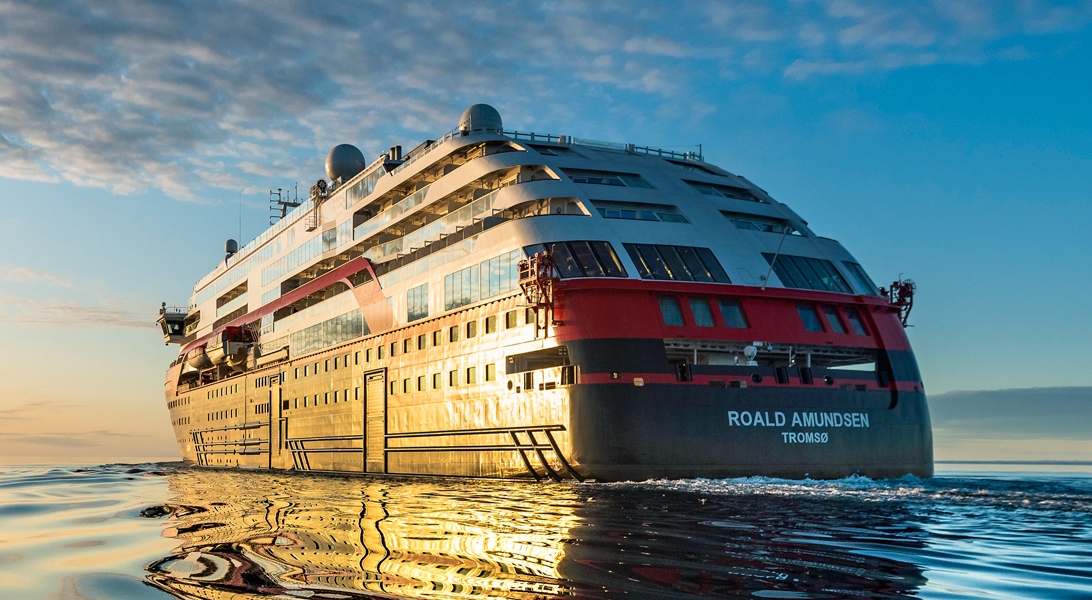









The images shown are for illustration purposes only and may not be an exact representation of what you find on the ship.
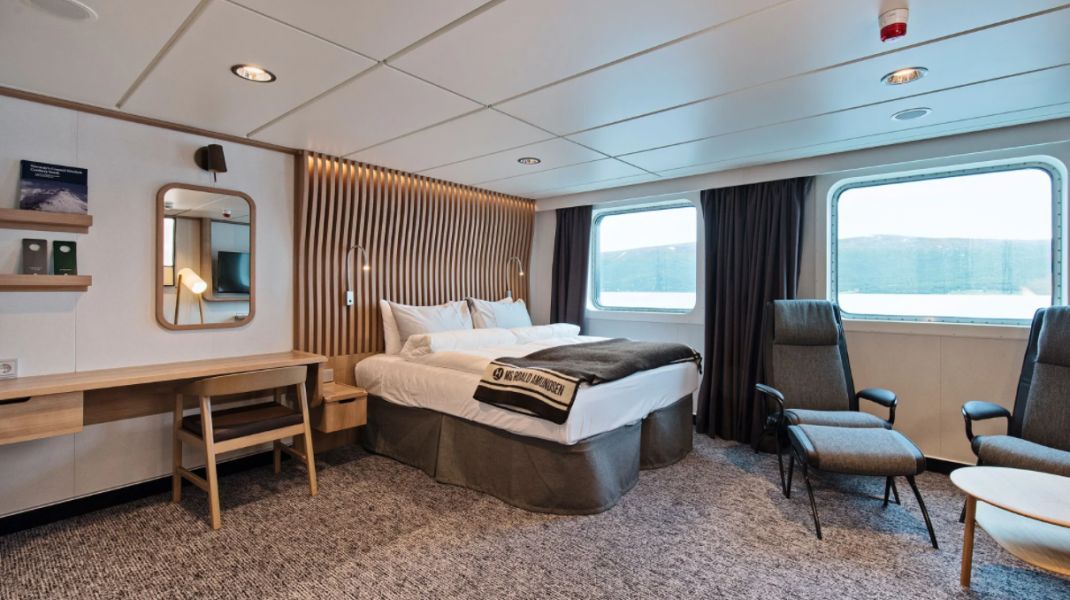
Large accessible cabins without balcony. Lower/middle decks, flexible sleeping arrangements, TV, kettle, tea and coffee.

Large cabins without balcony. Lower/middle decks, flexible sleeping arrangements, sofabed, TV, kettle, tea and coffee.
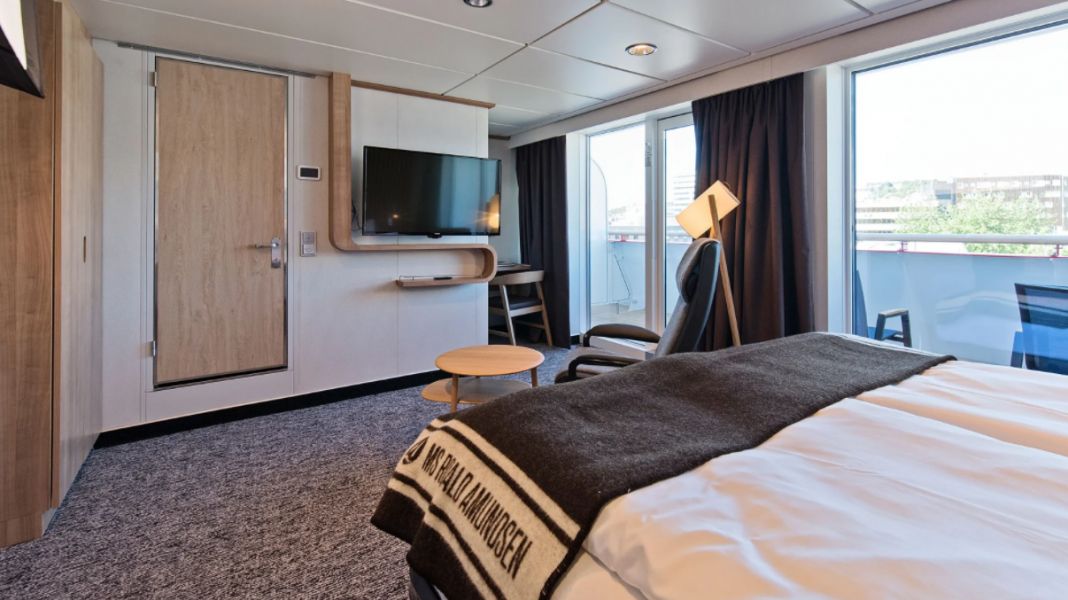

Accessible cabin with balcony. High deck, broad balcony, double bed, TV, kettle, tea and coffee.

Cabins on a high deck with balcony. Spacious cabins, different sizes, double bed, some with sofabed, TV, kettle, tea and coffee.

| Grade Code | From | To | |
| XT | Arctic Superior Outside Cabin with Balcony | £9,532 | £9,532 |
High deck cabins with balcony. Spacious cabins, different sizes, flexible sleeping arrangements, some with sofabed, TV, kettle, tea and coffee.
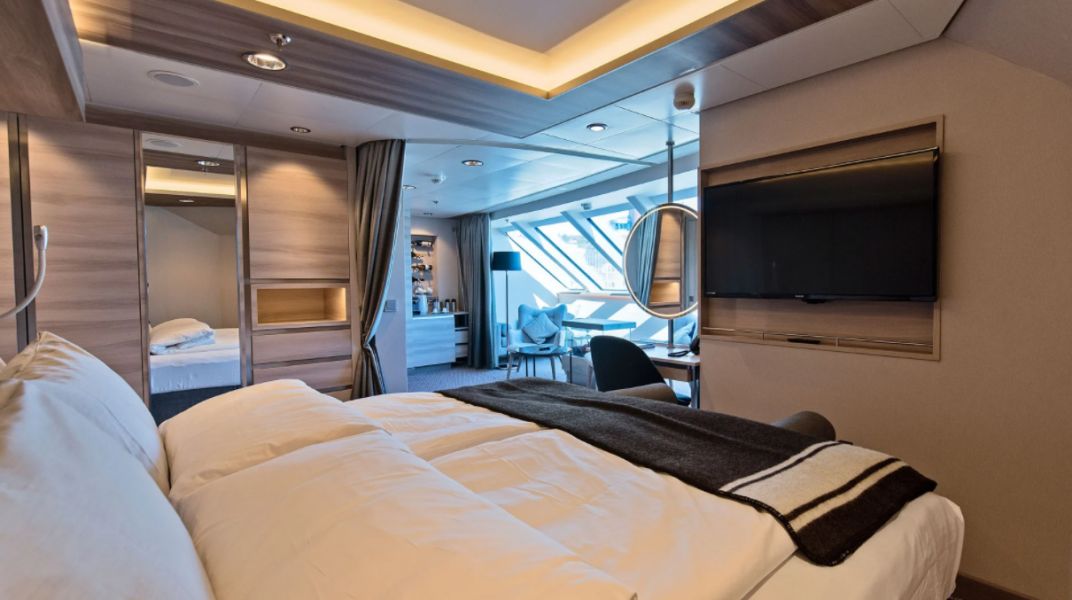
Corner suite with large windows. Corner suite with large windows. Flexible sleeping arrangements, TV, minibar, bathrobe, kettle, tea and coffee, espresso maker. Without balcony.
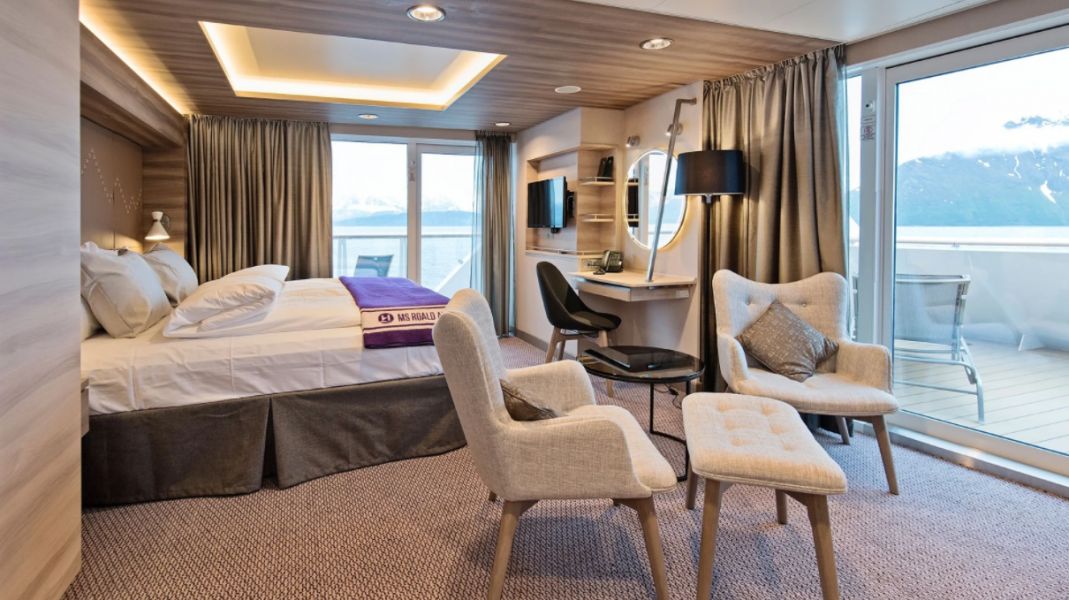
| Grade Code | From | To | |
| MC | Corner Suite with Balcony | £14,456 | £14,456 |
Aft Corner Suite with private balcony and hot tub. Various sizes, large windows, flexible sleeping arrangements, some with sofa, TV, minibar, bathrobe, kettle, tea and coffee, espresso maker
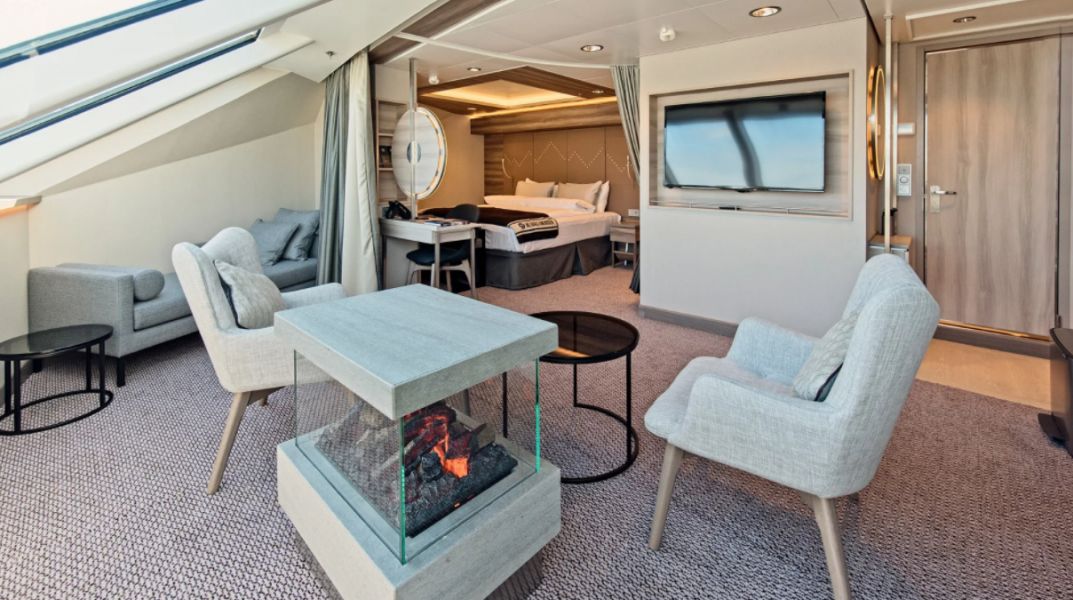
Large Corner Suite with private balcony, flexible sleeping arrangements∘, sofabed, TV, minibar, bathrobe, kettle, espresso maker. Adapted for guests with wheelchair.
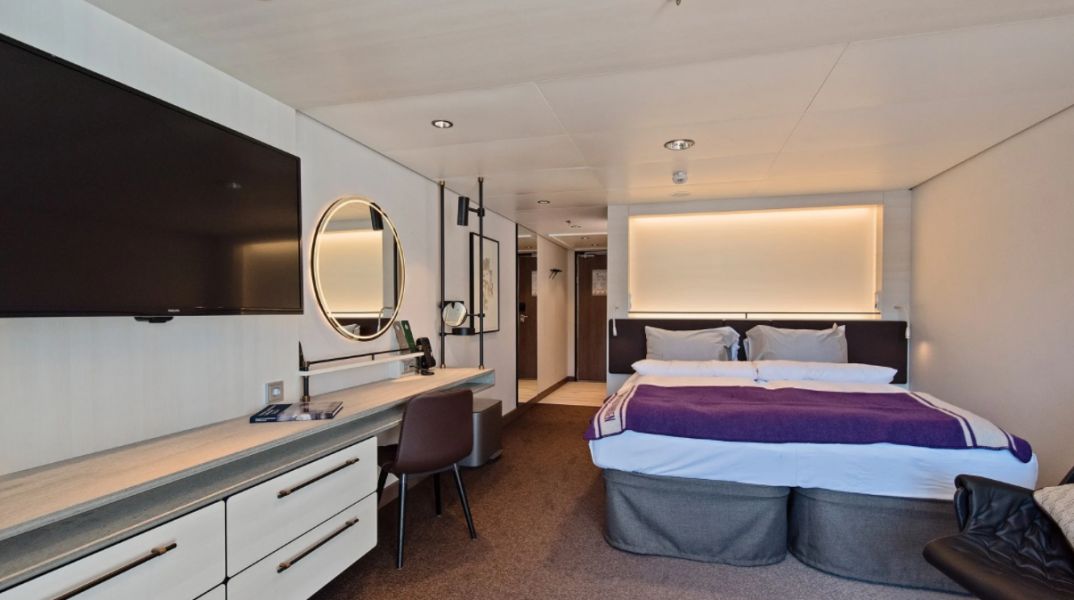
| Grade Code | From | To | |
| ME | Suite with Balcony | £10,436 | £10,436 |
Suites with private balcony, different sizes, top-high decks, flexible sleeping arrangements, some with sofabed, TV, minibar, bathrobe, kettle, tea and coffee, espresso maker.
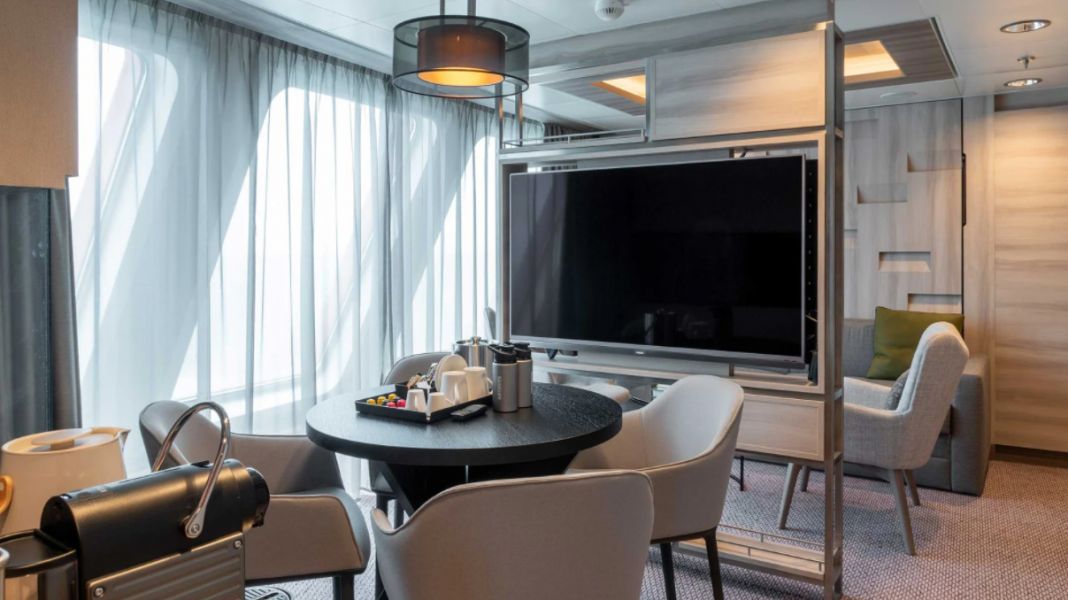
| Grade Code | From | To | |
| MB | XL Suite | £14,106 | £14,106 |
Extra Large Corner Suite∘ without balcony. Aft corner suite with sofabed, flexible sleeping arrangements, large windows, TV, minibar, bathrobe, kettle, tea and coffee, espresso maker.
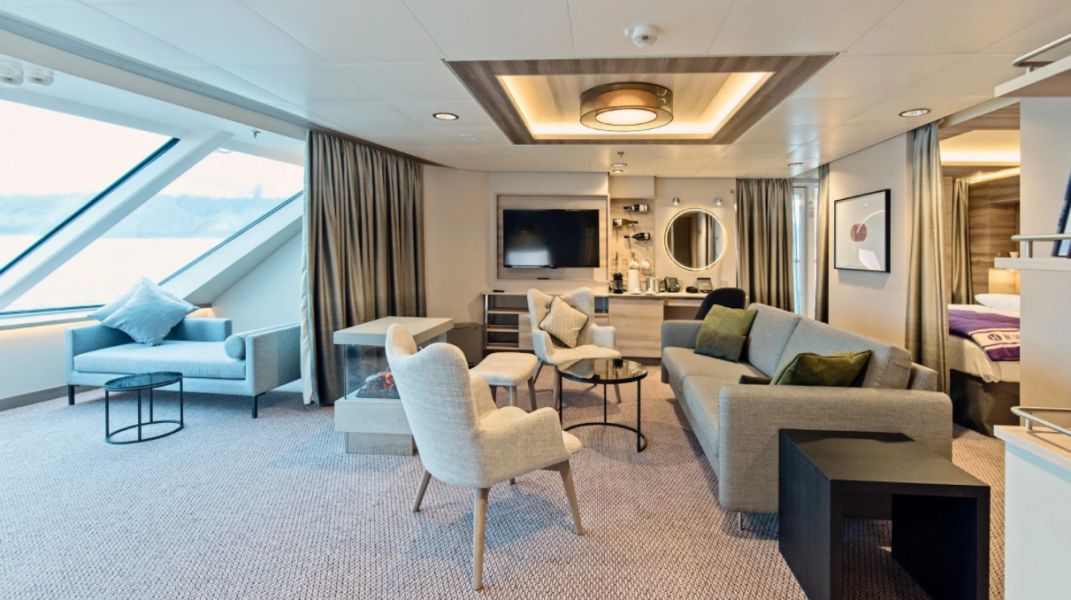
| Grade Code | From | To | |
| MA | XL Suite with Balcony | £18,184 | £18,184 |
Extra Large Corner Suite∘ with private balcony. Ship’s most spacious cabins with large windows, flexible sleeping arrangements, sofabed, TV, minibar, bathrobe, kettle, tea and coffee, espresso maker.
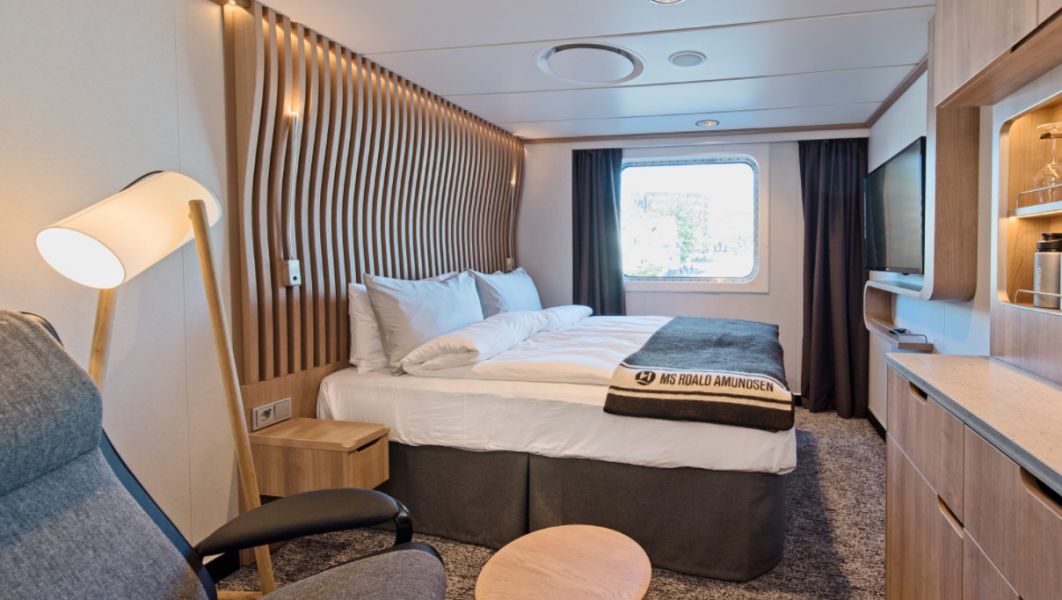
Cabins on middle decks. Double bed, TV.

Larger cabins on middle∘ decks. Most 20 square meters, flexible sleeping arrangements, some with sofabed, TV. Please note: This cabin is automatically made with a double bed. To order twin beds, please notify us at time of booking.
The images shown are for illustration purposes only and may not be an exact representation of what you find on the ship.
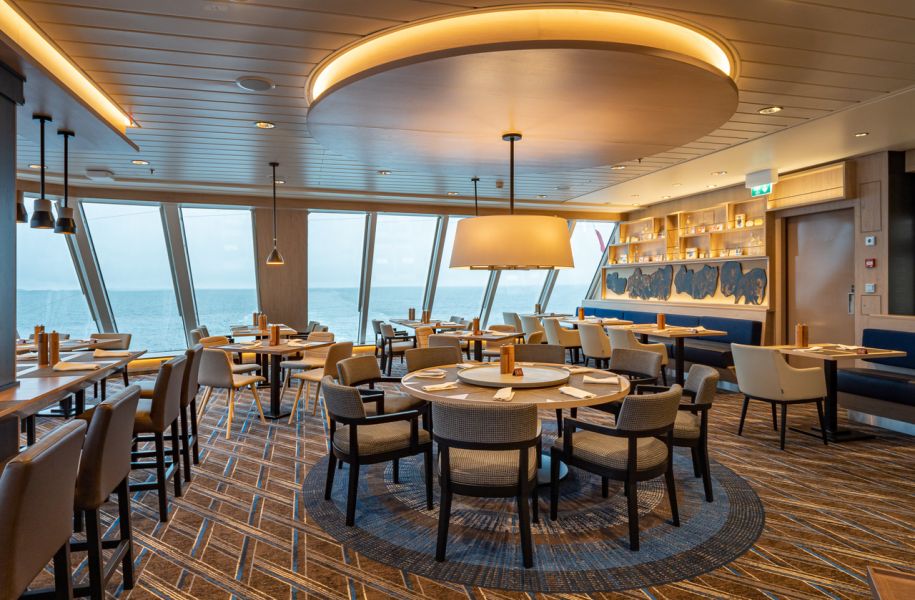
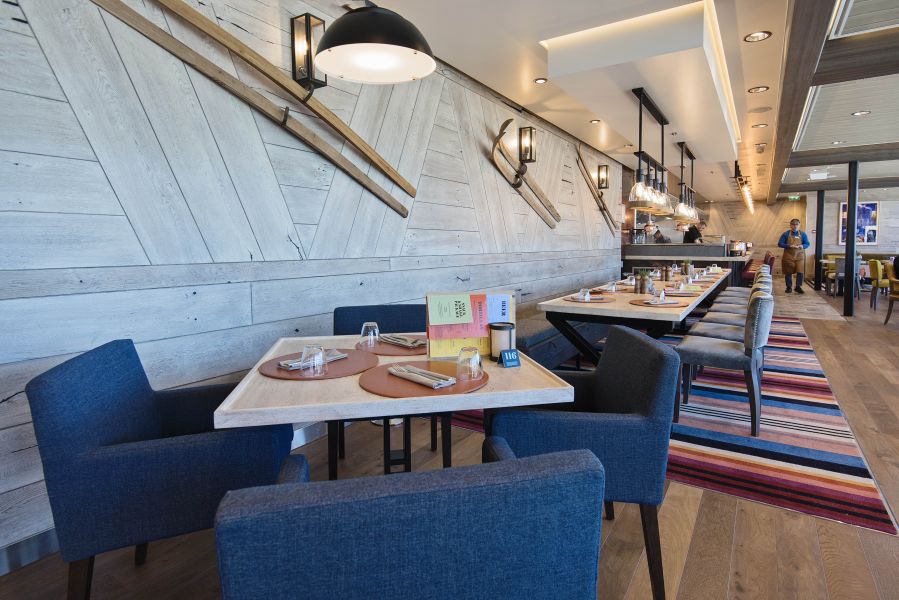
Based on the season's best ingredients, the chefs create either three-course dinners or lavish buffets. Being a coastal voyage, seafood dominates the menu, accompanied with fresh vegetables and delicately flavoured sauces. Each dinner ends with traditional desserts, like home-made cakes, puddings, berries or sorbet. Breakfast and lunch is served buffet style, while dinner is a set dinner.
The images shown are for illustration purposes only and may not be an exact representation of what you find on the ship.
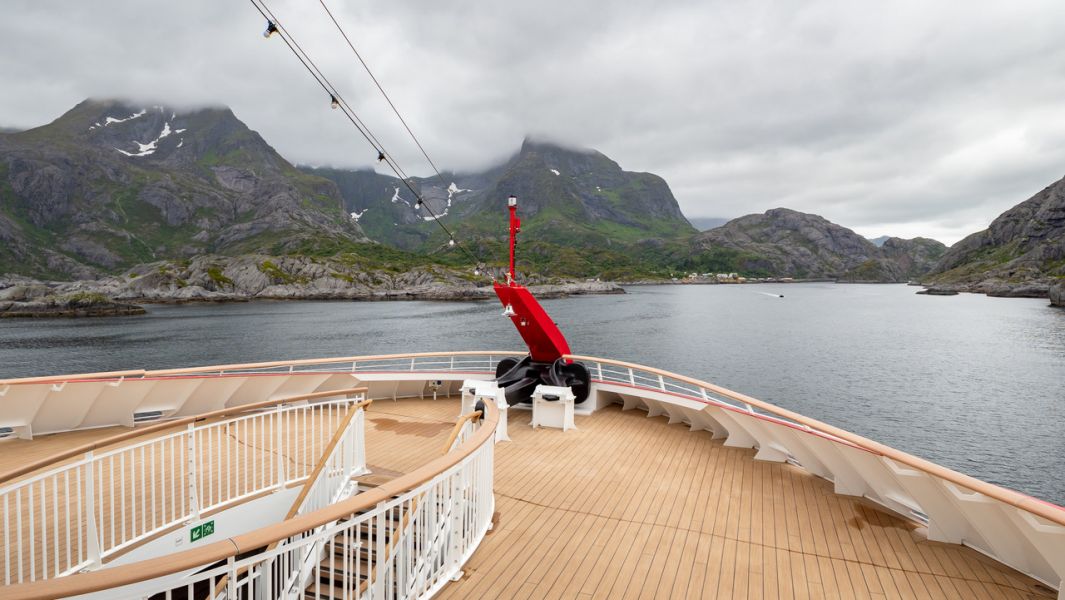
The ship has spacious outdoor areas. They are perfect vantage points to sit back, relax and watch the world go by. The observation deck is located on deck 11, where you will also find the outdoor gym and running track.
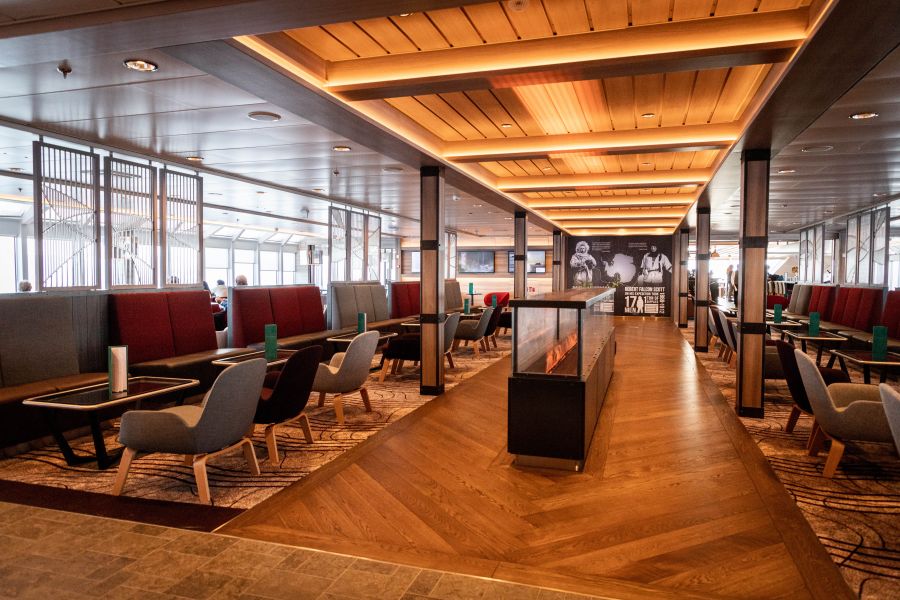
After a day of exploring new destinations, guests can relax and rejuvenate in the elegant Explorer Lounge, located on deck 10.

The ship has a small selection of books on different topics that is available to guests while on board. The library is located on deck 6.

The reception is located on deck 6.
The images shown are for illustration purposes only and may not be an exact representation of what you find on the ship.
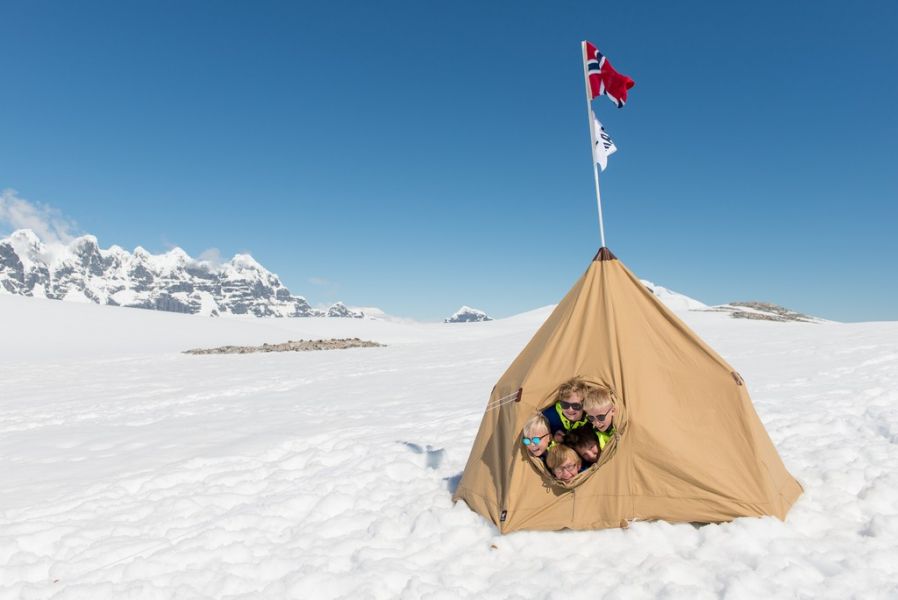
Young Explorer is a complimentary, year-round programme on selected Hurtigruten ships for curious and active youth aged 7-13 years of age.
The children will learn about other cultures, the importance of nature in our daily lives, and the impact humans have on our delicate and beautiful planet. The Young Explorers’ Programme makes it easier to meet other children on board, bond over common activities and form lasting friendships.
A dedicated Young Explorer host and daily on-board activities
A dedicated host will plan and organise all the activities, which focus on fun and eco-friendly learning events, tailor-made to awaken a sense of adventure. All Young Explorers will get a starter pack containing a t-shirt and activity book at the beginning of their voyage. Activity book assignments are related to the different exploration topics.
There will be daily on-board activities related to different Young Explorers’ topics. Through the Young Explorers’ Programme, children will get a deeper understanding of nature, climate and culture. Depending on seasons and destinations, they will also be introduced to topics like wildlife, local food, environmental protection and famous explorers. This will give the children a sense of what it is like to be a real explorer in beautiful, untouched surroundings.
Beach clean-ups
During each Classic Round Voyage in the summer on the Norwegian Coast, we will do a beach clean-up, teach the kids about the fragile balance that exists in the natural environment, and what we can do to protect it. This is done in cooperation with the Hurtigruten Foundation and Keep Norway Beautiful. Please note that beach clean-ups can’t be conducted if it’s snowy or icy.
The images shown are for illustration purposes only and may not be an exact representation of what you find on the ship.
| 15 nights aboard the MS Roald Amundsen | |||
| Full-board dining included | |||
| Wine, beer & soft drinks included with lunch & dinner | |||
| Complimentary tea and coffee | |||
| Range of included excursions | |||
| No gratuities | |||
| Complimentary Wi-Fi on board | |||
| Engaging onboard activities and lectures | |||
| Port Taxes and Fees | |||
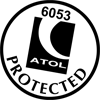 | ABTA and ATOL Protection* | ||
Date 28th Dec 2024 |
Nts 15 |
Oceanview  |
Balcony £9,532pp |
Suite £10,436pp |
Date 28th Dec 2024 |
Nts 15 |
Oceanview  |
Balcony £9,532pp |
Suite £10,436pp |

| Balcony staterooms from | £9,532pp | ||
| XT | Arctic Superior Outside Cabin with Balcony | £9,532pp | |
| Suite staterooms from | £10,436pp | ||
| MA | XL Suite with Balcony | £18,184pp | |
| MB | XL Suite | £14,106pp | |
| MC | Corner Suite with Balcony | £14,456pp | |
| ME | Suite with Balcony | £10,436pp | |
| Oceanview | Balcony | Suite | |
| (All prices are £GBP per person) | |||
| Fri 14th Nov 202514 Nov 25 | 8,827 | 10,548 | 11,852 |
| Mon 8th Dec 202508 Dec 25 | 8,847 | 10,333 | 11,607 |
Fusion Cruises when selling travel arrangements is a trading name of The Midcounties Co-operative Ltd. Fusion Cruises is an Accredited Body Member of Midcounties Co-operative Travel Consortium. (ABTA:P6652, ATOL:6053).
Book with Confidence. We are a Member of ABTA which means you have the benefit of ABTA’s assistance and Code of Conduct.
Some of the flights and flight-inclusive holidays on this website are financially protected by the ATOL scheme but ATOL protection does not apply to all holiday and travel services offered on this website. This website will provide you with information on the protection that applies in the case of each holiday and travel service offered before you make your booking. If you do not receive an ATOL Certificate then the booking will not be ATOL protected. If you do receive an ATOL Certificate but all parts of your trip are not listed on it, those parts will not be ATOL protected. Please see our booking conditions for information, or for more information about financial protection and the ATOL Certificate go to: www.caa.co.uk
